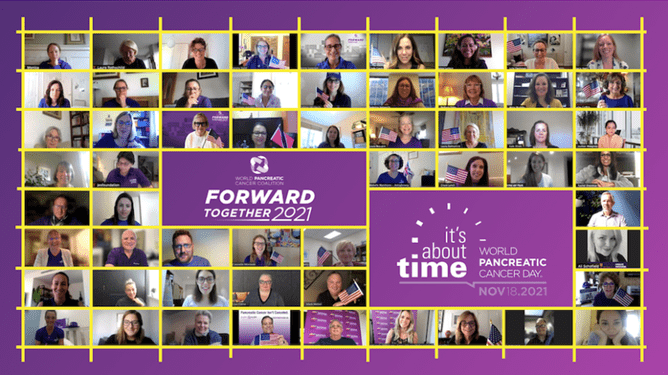The Gut Cancer Foundation is proud to represent New Zealand as part of the World Pancreatic Cancer Coalition (WPCC). Every year, the coalition of global charities and patient advocacy groups comes together for its annual meeting. This was the first opportunity the Gut Cancer Foundation has had to be involved, as last year’s event was cancelled completely due to COVID. This time around, a group of over 100 pancreatic cancer experts and advocates met virtually, and GCF Executive Officer Liam Willis was amongst the attendees.
“The WPCC annual meeting was a wonderful opportunity to learn about the latest developments in pancreatic cancer treatments and awareness, and connect with similar organisations from around the world, all with a common goal”, said Liam. “It’s easy to get lost in negativity when it comes to pancreatic cancer as the statistics and outcomes are so poor, but this meeting was about looking forward and coming up with some practical solutions to help improve these outcomes”.
Workshops were held across the two time zones to bring organisations from around the world together and continue with the coalition’s key aims; learning about emerging pancreatic cancer science, enabling the sharing of information and best practices, and continuing to raise awareness of the disease.
The Scientific Panel involving Dr. Elizabeth M. Jaffee and Dr. Anirban Maitra that took place on day one was a fascinating insight into the latest innovations around early detection that are on the horizon.
On days’ two and three the attendees came together to focus on three key areas for pancreatic cancer:
- Diet and Nutrition
- Molecular Profiling
- Clinical Trials
Groups discussed the challenges faced in each of these areas and the work that could be done to help address them:
- Diet and nutrition – Diet is not made a priority when treating people with pancreatic cancer and patients are not getting access to a dietitian as often as they should. There is a lack of awareness amongst health care professionals, particularly in non-specialist settings, about how the pancreas works and how diet and nutrition and enzyme replacement therapy can have a huge effect on survival – often improving quality of life to the same degree as treatment.
- Molecular profiling – Different molecular profiling technologies are used to look at the genetic make-up of both patients and their tumours in order to identify mutations (changes in their DNA). This information can then be used to help diagnose and tailor treatments for each patient depending on the types of mutation they have. Molecular profiling isn’t widely known about. Patients find out after a diagnosis they could have taken a test and that certain mutations are specifically linked to pancreatic cancer. Testing across the global health care landscape is inconsistent when it should be considered routine. Education for both the public and health care professionals needs to take place, alongside discussions around ethics, funding, and the sharing of best practice.
- Clinical trials – It was recognised that clinical trials are not being accessed as easily and often as they should be. There is no global directory of where and when these are taking place making them difficult to locate, particularly for disadvantaged populations. The lack of visibility and understanding also leads to mistrust and clouded opinions of how they operate.
How might the ideas be taken forward?
- Patient empowerment – Patient empowerment was a huge theme throughout the discussions at the conference; patient education, clear resources, and having more in-depth conversations with health care professionals. It was also recognised that more funding should be made available so they have better access to health specialists, more treatment options, and health insurance.
- Education for health care professionals – Health care professionals need greater education around all 3 key themes and the coalition can work together to help ensure diet and nutrition, molecular testing and clinical trials are all better understood within the community.
- Raising awareness – There were three campaign ideas that the World Pancreatic Cancer Day committee could potentially take forward and explore for future global awareness campaigns, including a focus on the pancreas itself and helping to educate people on the molecular testing and clinical trials.
- Improving resources – An important outcome of the diet and nutrition discussion was to improve information resources into multiple languages around this subject, which is something the coalition could work together to provide. This expanded to other areas with some big discussions around a molecular profiling audit which would enable us to understand what was happening in each country and see a worldwide picture, as well as creating a portal of all the open and rolling clinical trials across the world.
In addition to these details, practical and collaborative discussions, the meeting introduced plans for the next global World Pancreatic Cancer Day (WPCD) campaign. This year, WPCD takes place on Thursday, November 18th and the Gut Cancer Foundation will be playing our part to Shine A Light on pancreatic cancer with an extensive awareness campaign throughout the month of November.
You can find all of the links to the recordings of the sessions below:
2021 WPCC Annual Meeting – Day 1 – Welcome & Update
2021 WPCC Annual Meeting – Day 1 – Science Panel
2021 WPCC Annual Meeting – Day 3 – WPCD Campaign Preview
2021 WPCC Annual Meeting – Day 3 – please be advised this is a personal account of Bryony’s experience of pancreatic cancer which some viewers may find upsetting – Bryony Thomas
